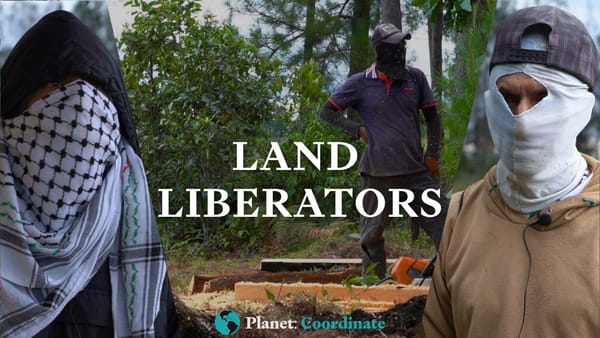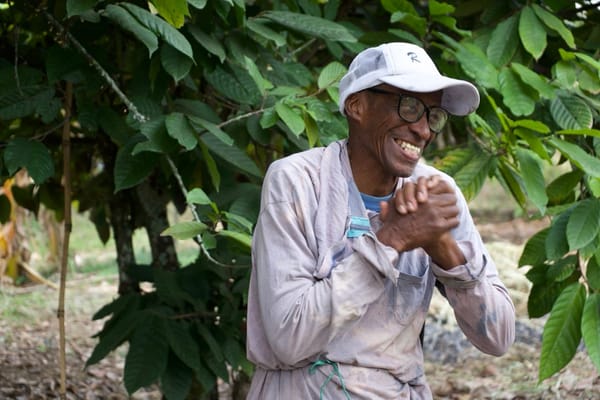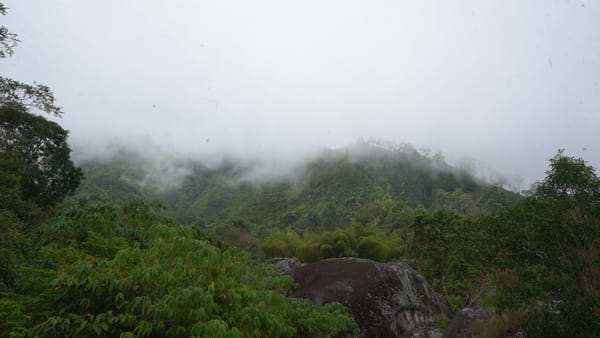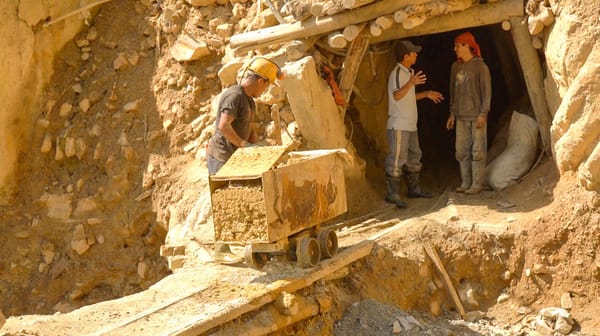How To Confront The Beast
Visión Suroeste: Part 3 of 3

This is part 3 of our report on a resistance movement in Colombia. Read Part 1 and 2.
When the mining company, AngloGold Ashanti, arrived in Antioquia over a decade ago, they needed access to the land to establish whether or not a mine was viable. Their strategy was the same as many destructive industries all over the world: they lied.
They set their sights on Jericó, the neighbouring town to Tamesis, and approached local farmers under the guise of pretending to be an agricultural initiative. They pretended that they could help the farmers increase the health of the soil and improve the agricultural practices. The farmers, believing them, agreed for the company to begin testing their land.
It took some time, but once word got out that the strangers were testing for minerals in the soil, the farmers rescinded their invitation. The company came anyway. So the farmers organised quickly, using their own bodies to block the company’s access to roads. These stand-offs went on for years. The farmers protested weekly, blocking the company’s access and spreading word through the town. They set up a local newspaper to warn of the company’s action and encourage support for their movement. They insisted that Jericó has always been, and should remain, an agricultural zone, and that mining would destroy the traditions and social relationships in the town.
But the company didn’t back off, instead enlisting Colombia’s special police force who, we were told, had been instructed that the farmers were illegally blocking the company from their own land. This was a lie. The farmers would explain to the police force every time what had actually happened, forcing the company to enlist different squads who had no idea of the truth.
Sometimes the company would deposit machinery necessary to test and drill, leaving it overnight begin digging up the land the following day. The farmers enlisted the help of former employees who had left once finding out the truth to dismantle the machines overnight. These employees are now fighting lawsuits filed against them.
The company changed their strategy after their cover was blown. They continued employing locals and told them that they needed the mine, that they were under-developed and poor, and that only through this vast multinational project could they see a decent quality of life. This is laughable. Jericó is quaint and content, rich in tradition and history. But the lies started to seep in. AngloGold Ashanti understood the power in controlling the narrative and families were driven apart. Some people wanted the mine and all the promised benefits, others continued to warn against its devastating impact.
Robert: Throughout our time in Antioquia it became clear that this trend of dominating narrative and manipulating language was a consistent form of violence. “We are coming to realise how we are colonised, even from the language” mused one of our guides. Towns named after European settlements, Milan, Venice, even Tamesis named for the Thames in England, are dotted throughout Colombian maps. Christian symbols were intentionally placed on indigenous sacred sites. The first murals painted in these towns were of European landmarks. As if to say, Europe is what you should strive to be like, Europe is what is worth protecting. These forms of violence infect people’s minds and soften them to the idea of sacrificing what they do have for a concept of what they might have.
AngloGold Ashanti set up shop in Jericó under a different name, their slogan boasting their proud contribution to the energy transition. They continued to face-off against the farmers every week. The protests began, and remain, in the spirit of non-violence. But these 200-odd farmers could not hold off the fight by themselves. They joined forces with other land defenders, including the concerned citizens of Tamesis who knew their territoria was on the chopping block, too. They diversified their tactics, getting local defenders elected to small positions of authority, such as legal representatives of the local aquaducts. Swiftly, the movement grew to include farmers, indigenous defenders, youth, residents and even politics, with Gustavo Petro, Colombia’s first left-wing President in decades, visiting Jericó and offering support.
Rachel: We contacted President Petro’s office upon learning that, asking for an interview. To our amazement, we got a response, promising that if a slot opened up we would be able to speak with the President. Whether or not this happens, it was a small but infinite gesture of a different kind of politics: One that makes time for independent initiatives, respecting the networks we weave together that offer an alternative to a world dominated by centralised power.
But something happened. After over a decade of fighting, people started to burn out. They were running out of energy to fight a beast which had infinitely more resources than them. They couldn’t see beyond the fight. They didn’t have much more to give.
They realised that, to go up against the beast — which they define as multinational capitalist forces — they needed beauty.
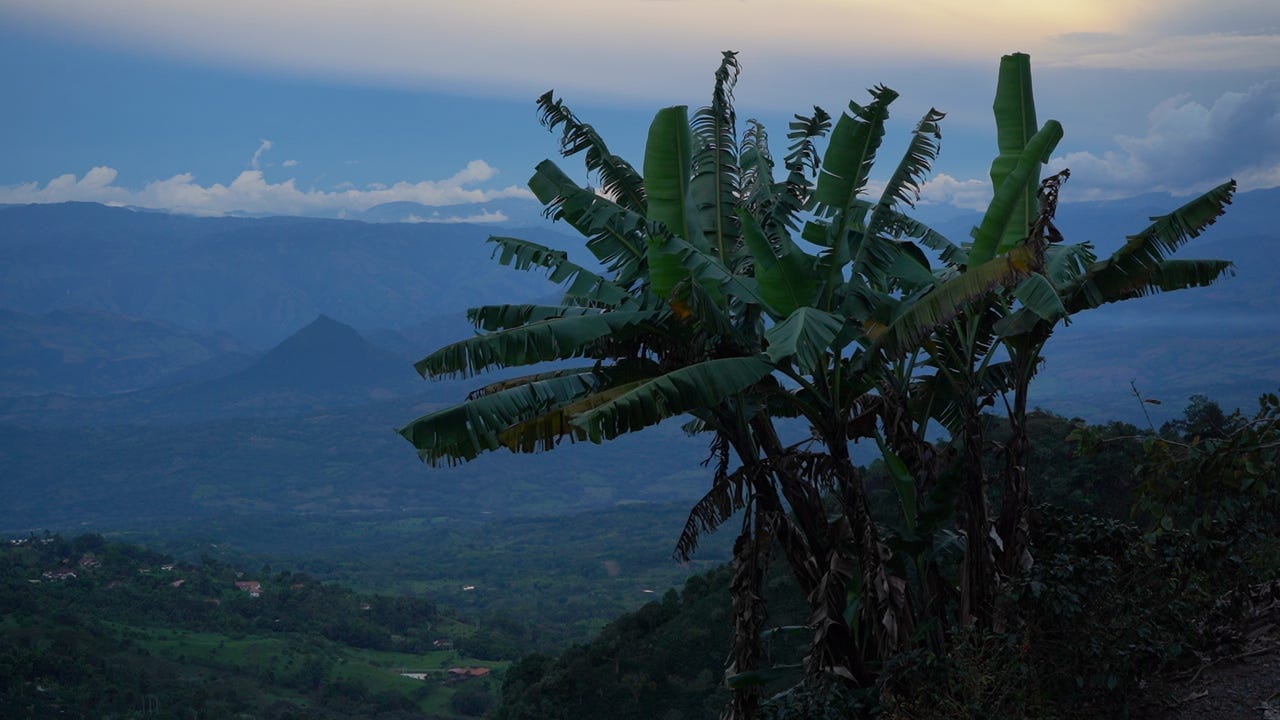
We interviewed Kata, one of the cofounders of Visión Suroeste, a Colombian filmmaker based mostly in Paris. She has a beautiful story about how she came to be part of the movement operating out of her hometown after making a film in the region. The locals reached out to her and asked for her help building the narratives they needed to win this war and she immediately agreed. After a few years, her body was on the brink of breakdown. She told us a story of when, in utter exhaustion, she could do nothing but lie and listen to the birds outside her window. It was then that the idea of beauty came to her, and Visión Suroeste developed a new strategy.
They began to weave love into everything they do. They realised that they could not hold off this company forever — they needed more people to resist with them, and to do so, they needed to show why.
Astrid launched an annual music and arts festival on the bank of the River Frio, showcasing the wonders of the mountain and the vibrant necessity of the river which gives them all life. Her husband wrote songs to the mountain, music of love and promise, dedicated to the magic of their territoria. Their son, Maxi, is a key member of The Pollinators, a youth-led science group which takes groups birdwatching and teaches younger children about the many species hidden in the land. The Pollinators often team up with a participatory science group launched by the team at Visión Suroeste, whereby locals learn how to observe and collect data on the nature they protect, led by volunteer scientists and in collaboration with nearby universities.
Alongside this, a co-working cafe, Casa Solar, was launched promoting indigenous art, symbols of resistance, and other traditional crafts, so that the indigenous defenders have a marketplace for the beaded bracelets they make in resistance against the mine. Maxi’s grandmother runs the cafe, and it’s where the Visión Suroeste team meet to organise themselves. They are committed to spreading the word online, showcasing the beauty of the mountains they have promised to defend.
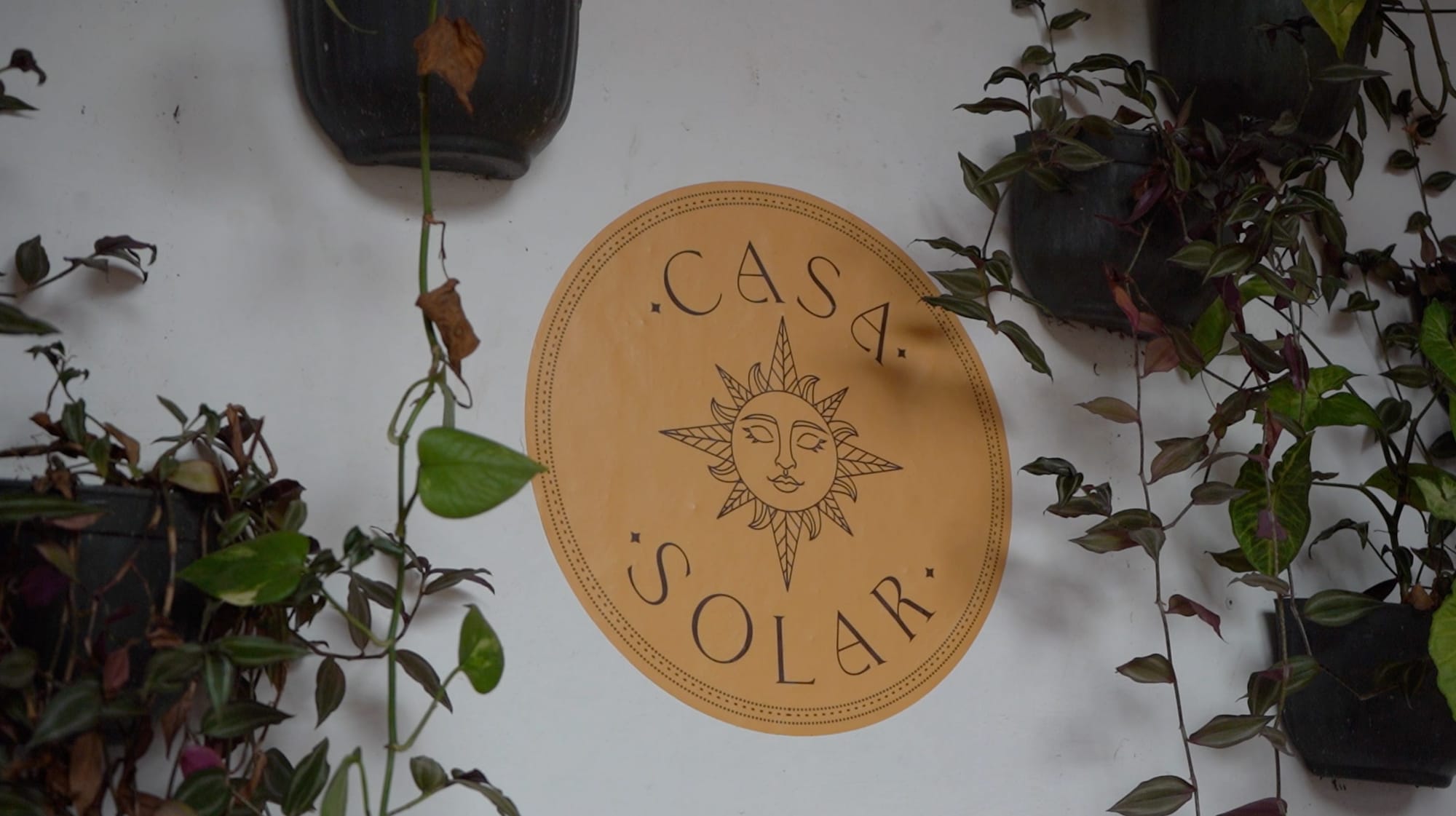
They have also organised interdisciplinary teams to help educate and transition local farmers away from monoculture plantations, instead planting agro-ecological plots of their main product, supported by many other plant species which promote local biodiversity. Understanding that transitioning represents an up-front cost for farmers, the co-working cafe offers a marketplace where the farmers can sell their goods for a higher price, sharing that cost out between community members. In a similar vein, another cafe was launched with help from a Colombian NGO that only sells agroecological coffee produced by local farmers, creating a collective of 12 previously separate and independent farms who now work together to provide the high quality beans. There are many other initiatives to help local farmers transition their cocoa plantations, teaching the locals how to make cacao nibs and other chocolate products. The team also works with the original defence movement who have been guarding this land for decades, deepening plans for water security in the region.
Robert: It may be controversial to say, but I have sympathy for miners the world over who resist the closure of their workplaces. In my home town in Australia, decent, hardworking, caring people vehemently support and work in coal mines. They have never been show another way of living, they are not fully aware of the impacts of fossil fuels, and their concerns are not alleviated. Rarely are they offered a feasible path for what happens after they lose their livelihoods. But we have more in common with these people than we do not. Most people just want to support their families. Surely, that is something we can sympathise with and use as a mutually shared platform to bridge the gap between our values and restructure the cultural and psychological walls that implicitly exist in our society. The people of Vision Suroeste have found a way to do this. They offer monoculturists a reason to abandon destructive practices and a way of transitioning to sustainable livelihoods. They have found a way to incorporate and welcome, rather than vilify those they have differences with. Therein lies, I think, the key to building a better world.
One of Visión Suroeste’s core beliefs is that to love a thing you must know it. Rather than demand support from a position of moral authority, they have worked diligently to invite their neighbours into a learning process in the hope that by building awareness of how teeming with life their territoria is, others will join the call to protect it. This is a strategy which promotes deepening each person’s relationship to the land, and generating new relationships between each other with smart economic decisions, which both strengthen and diversify the root networks that keep the soil of their home intact. They work from the premise that love is a better motivator than fear or righteousness.
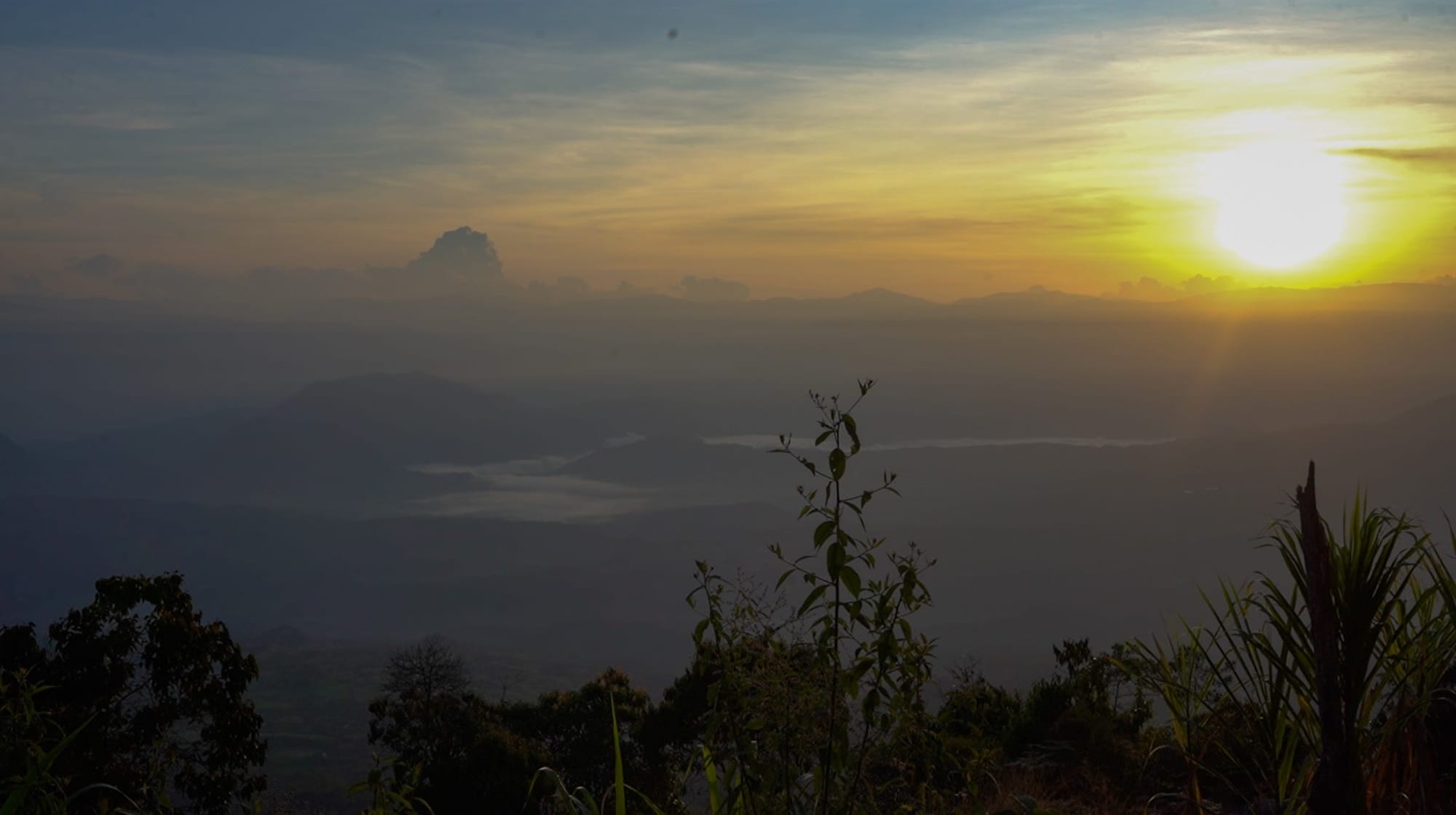
This means their approach is always multi-pronged. They listen first, finding out what people need, what they lack, and then devise a strategy for that need to be filled by the local community in a way that also promotes the land’s health. They understand that people cannot be asked to sacrifice their livelihoods, and that if they can build a solid and interdependent local economy then their neighbours will be able to resist the mine for much longer. They understand that learning is tactile and progress material, that the impacts must be tangible and localised to their territoria. With every action, they are weaving together new relationships between people, nature and politics, showing how to gain freedom and independence rather than demanding those concerns be sacrificed temporarily for a greater goal. There is no greater goal, because for the people of Tamesis and Jericó, theis security lies in the integrity of the web of life that surrounds them. They are part of the mountain. They need to defend it as much as it needs their defence.
Rachel: I have always been suspicious of when people talk about the importance of highlighting economic value when promoting “solutions”, convinced doing so only promotes financialisation and entrenches a dangerous narrative that economics is the priority. I still think that on a national and international level, but Vision Suoreste showed me that what happens and is said at the ground level is very different. When the locals talk about economics, they’re talking about the mechanism of their survival, not politics or theory. The market, to them, is not the FTSE or an invisible hand, it’s the town square and the wider network of relationships that support each other to exist. Suddenly, the niggling question of scale clicked into place: Things lose their form when expanded into ideological constructs which blanket nations and discussion, bludgeoning idiosyncrasies into homogenous masses. It is impossible for a national economic strategy to reflect the idiosyncrasies of locality, or make space for them to flourish of their own accord — unless it decentralises. But decentralising threatens power, and so each node of economic activity is valued by a single metric — wealth — and subject to a singular strategy of external investment. This doesn’t help people build relationships between themselves or figure out how to care for each other. It creates a job market, selling off basic human needs to corporate entities who share the same unilateral approach of provisioning (poorly) rather than facilitating. In the territoria of Visión Suroeste, politics does not mandate their decisions, it reflects the reality of their decisions, creating a diverse and meaningful network of people figuring out how to take care of one another in order to take care of themselves.
Visión Suroeste have woven a network of resistance bound by their territoria which prioritises strength in diversity and binds itself to a location. This binding is not an inhibitor but a multiplier. By not spreading themselves too thin, they have ensured that every action they take reinforces the overall ecosystem of their relationships with each other and the mountain. This is the strength of decentralisation. The amount of good they can do at scale is enormous, fending off one of the biggest mining companies in the world and rewiring their local economy. And this is all possible because they know each other.
Robert: I asked an agroecological farmer how he prevented crops from being eaten if he didn’t use pesticides. He said some of his vegetables were mostly consumed by insects but that was okay. The diversity in life he and his partner had cultivated created a diverse ecosystem where some plants attracted certain insects, and those insects ate other insects. Some plants were for him, and some plants were for them. They had intricately weaved one of these networks of resistance in their backyard. Their scale was small, but it was bolstered by the other small networks woven around them.
Human beings are a caring species. We don’t readily and easily cause harm to those we know. That’s why destructive industries hire strangers to cut down forests and gouge open the earth, why the national guard is sent in instead of local police force, why, in some European countries, ticket inspectors have to travel across the country to do their job meting out heavy fines. We love what we know, and we don’t like to harm what we love. Or, on an even more basic level, we don’t want to be shamed by our community for being an arsehole by fining our friend’s child’s schoolteacher when he forgets his wallet on the tram. These relationships diminish the amount of harm we can do to one another. Stripping them away unleashes the capacity for hurt.
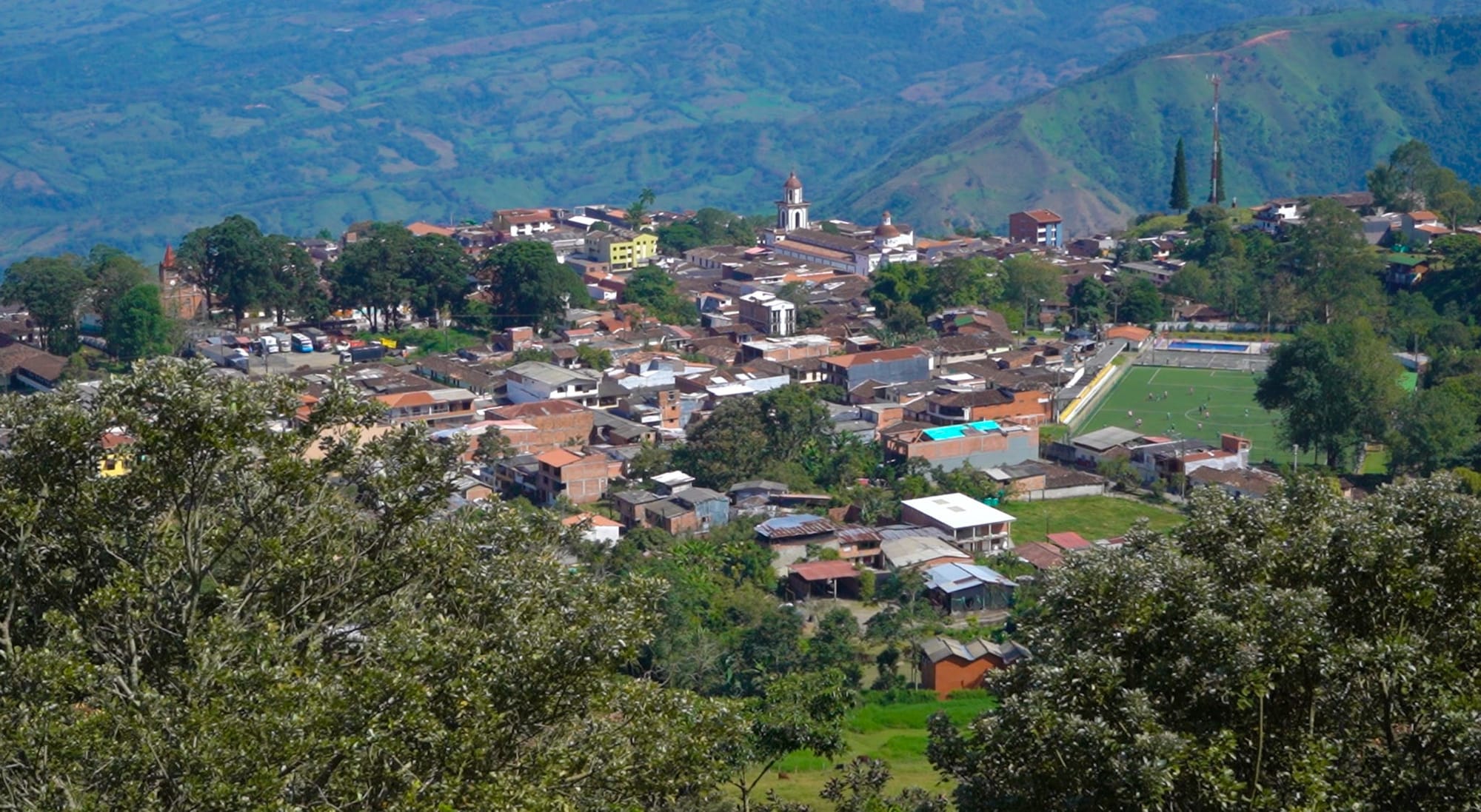
Care flows through the ties that bind us. Small-scale communities have many more ties than single streets in cities because they are interdependent and know one another. WE were confronted with the thought that perhaps effective action can only happen at a small scale, that scaling up will always sacrifice the intimate knowledge from which love springs forth. The conversations we had between ourselves, back in our small cabin after long days filming, centred around this theme. Decentralisation is the only way. Imagine if Colombia was filled with alternatives like these, and they were all connected to each other, like an ecosystem of resistance — imagine how difficult it would be to uproot them.
Rachel: There is a paradox of “the chains of freedom” which speaks to the responsibility we bear when making choices. I began to see that paradox in a new way, not as chains but as roots. Freedom for the people of Tamesis and Jericó is not succumbing to a multinational, preserving the wildness of the mountain and protecting their economic autonomy. Freedom means guarding the opportunity to say no, it means digging down and reaching out. It is intimately connected to the land they love; their territoria is their freedom, and they are bound to it. Freedom is interdependence, not independence.
What does resistance look like? Resistance is not merely an oppositional force. And thank god it isn’t, because we are not equal to the states and companies which seek to squeeze everything we have to give. The most important work of resistance happens underground, when we develop the root networks between ourselves that hold the ground steady when power tries to pull us out. Resistance is planting seeds and watering shoots and working with the teeming power of life itself all around us. Resistance is listening to what people need. Resistance is making space so others have somewhere to retreat. Resistance is placing ourselves at the bottom of the mountain and learning the miracles which burrow and fly and wind over every inch of its height. Resistance is learning that we cannot sacrifice the intangible to protect the tangible. Resistance is refusing to speak for, but speaking with. Resistance is refracting in the light, blinding those who come with their bludgeons and hammers. Resistance is rooting down and reaching out.
Resistance is beautiful.
Planet: Critical tells stories from the frontlines of communities who are building a better world. Subscribe today to support the project!
Our film on Visión Suroeste will be out later this year. Please be patient as we try to pull everything off — there’s only two of us. We’re running this documentary project, the Planet: Critical podcast, and Rachel is writing a book. Your support means everything when we’re in the thick of it like this.
We have another report due out after spending time with the Tapestry of Alternatives in Cali, are booked in to film a different resistant movement in March. We plan on doing this all year and are compiling a list of potential partners all over the world. If you know of a movement which would be perfect for this project, please fill out this form.

